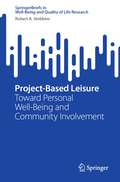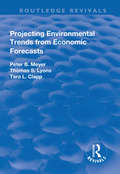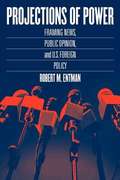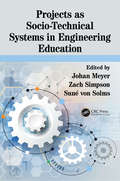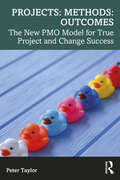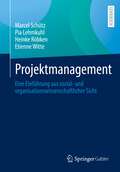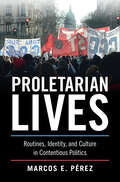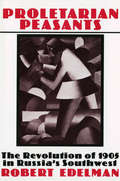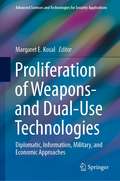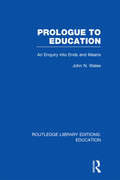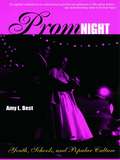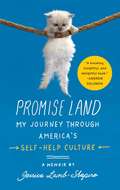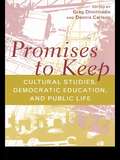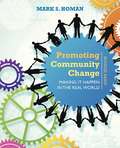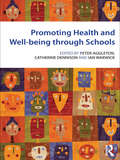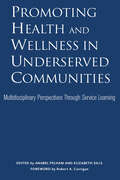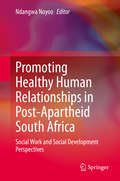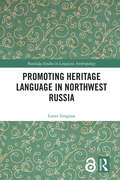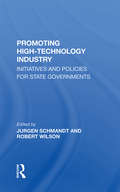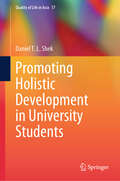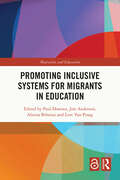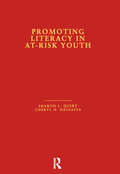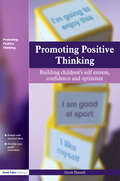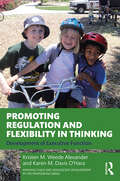- Table View
- List View
Project-Based Leisure: Toward Personal Well-Being and Community Involvement (SpringerBriefs in Well-Being and Quality of Life Research)
by Robert A. StebbinsThis short book discusses the relatively new concept of project-based leisure in leisure research, and relates it to individual and community well-being and quality of life. The book defines PBL as a short-term, reasonably complicated, one-off or occasional, though infrequent, creative undertaking carried out in free time, or time free of disagreeable obligation. Such leisure requires considerable planning, effort, and sometimes skill or knowledge. The book discusses how PBL contributes to subjective well-being, though doing so more modestly than serious leisure and occupational devotion. The book surveys existing field research of the author’s own and other studies, and provides original insights on how PBL activities can be used to generate community involvement and subjective well-being.
Projecting Environmental Trends from Economic Forecasts
by Peter B Meyer Thomas S Lyons Tara L ClappThis title was first published in 2000: Sustainable development offers visions of the future, but implementation of new sustainable policies seems slow. This text presents a forecasting method directed to overcome some barriers to the implementation of more sustainable economic policy. Using a case study, the authors describe how economic and environmental forecasts can be developed that are relevant to the immediate concerns of policy-makers and are more likely to lead to policy changes. A combination of forecasting methods are shown to evaluate a range of current alternatives in the future. Similar techniques have been used in developing countries, but here the techniques are applied to an already industrialized economy.
Projections of Power: Framing News, Public Opinion, and U.S. Foreign Policy
by Robert M. EntmanTo succeed in foreign policy, U.S. presidents have to sell their versions or framings of political events to the news media and to the public. But since the end of the Cold War, journalists have increasingly resisted presidential views, even offering their own spin on events. What, then, determines whether the media will accept or reject the White House perspective? And what consequences does this new media environment have for policymaking and public opinion? To answer these questions, Robert M. Entman develops a powerful new model of how media framing works -- a model that allows him to explain why the media cheered American victories over small-time dictators in Grenada and Panama but barely noticed the success of far more difficult missions in Haiti and Kosovo. Discussing the practical implications of his model, Entman also suggests ways to more effectively encourage the exchange of ideas between the government and the media and between the media and the public. His book will be an essential guide for political scientists, students of the media, and anyone interested in the increasingly influential role of the media in foreign policy.
Projects as Socio-Technical Systems in Engineering Education
by Johan Meyer Zach Simpson Suné Von SolmsThis book presents the case for Project-Based Learning within Socio-Technical Systems in Engineering Education. The book highlights the importance of projects as Socio-Technical Systems as a means for supporting and enhancing international accreditation of engineering programs. Practical examples illustrate how Socio-Technical Systems are brought into the educational environment through Project-Based Learning. The book goes on to discusses the impact this may have on Engineering Education practice. <P><P>The work presented will enable engineering educators to develop curricula that can respond to societal needs, while also enhancing teaching and learning. It offers an approach to engineering education that centers on engaging scholars in projects that are located within socio-technical systems. University, government and industry leaders will gain from this book as it provides insight into strategic planning and partnership-building for Engineering Education. We hope this book will further foster deep scholarship of research to ready engineering faculties for engaging responsibly with their surrounding communities. <P><P>Features: <li>Offers applications of Project-Based Learning (PBL) in Engineering Education <li>Matches elements of Socio-Technical Systems in Higher Engineering Education, with the Exit Level Outcomes (ELOs) required by professional engineering bodies <li>Provides practical examples for the establishment of project environments within an academic faculty <li>Shows examples in the success of execution of projects involving engineering educators, researchers, program developers, government agencies and industry partners <li>Presents a framework to develop Project-Based Learning in Engineering Education that addresses Socio-Technical requirements and will enable engineering educators to collaboratively develop engineering curricula with industry that will respond to societal needs
Projects: The New PMO Model for True Project and Change Success
by Peter TaylorMatching the speed of change in modern business, this book takes readers on a two-year journey in building a project management office (PMO) for today and tomorrow and redefines the PMO as to what it should focus on: Projects, Methods, and Outcomes. Many organisations invest heavily in PMOs, but these are built on an outdated and static model that does not fit a hybrid, agile, AI-empowered, and rapidly changing business environment. Building on his renowned "balanced PMO" model, project management leader Peter Taylor tackles today’s challenges with this diary-style guide to inspire all PMO leaders, project managers, and business leaders, and provide a roadmap to follow to build (or rebuild) their own PMOs. He presents a completely new definition of "PMO", eliminating the traditional back-office concept of a centralised PMO, with his "Projects: Methods: Outcomes" construct that provides a truly business focused team to oversee the delivery of value to their organisation. Enriched with case studies and practical models, this book will benefit all PMO leaders, project management professionals, change and transformation leaders, and anyone interested in how to deliver business value through projects.
Projekt- und Teamarbeit in der digitalisierten Arbeitswelt: Herausforderungen, Strategien und Empfehlungen
by Erich Latniak Simone Kauffeld Susanne Mütze-Niewöhner Winfried Hacker Thomas Hardwig Manuel Nicklich Ulrike PietrzykEin interdisziplinäres Open-Access-Buch für Wissenschaft und Praxis. Projekt- und Teamarbeit besitzen als Formen der Arbeitsorganisation eine hohe praktische Relevanz, die mit den Möglichkeiten der Digitalisierung und Vernetzung noch zunimmt. Der Fokus der öffentlichen Debatte um die Digitalisierung der Arbeit liegt auf technologischen und datentechnischen Innovationen. Dieses Sammelwerk ergänzt die Diskussion, indem es sowohl die Potenziale kooperativer Arbeitsformen für die Bewältigung aktueller Herausforderungen als auch die Auswirkungen digitaler Transformationsprozesse auf die Projekt- und Teamarbeit beleuchtet. Es diskutiert notwendige soziale Innovationen und liefert wichtige Impulse für die Humanisierung von Arbeit. Die Beiträge behandeln insgesamt ein breites Spektrum aktueller Fragen rund um die Gestaltung und Führung von digital unterstützter Arbeit in agilen, virtuellen oder hybriden Teams und Projekten. Jeder Beitrag schließt mit konkreten Empfehlungen für die Praxis.
Projektmanagement: Eine Einführung aus sozial- und organisationswissenschaftlicher Sicht
by Marcel Schütz Heinke Röbken Pia Lehmkuhl Etienne WitteDas Lehrbuch bietet einen grundlegenden Überblick über sozial- und organisationswissenschaftliche Aspekte des Projektmanagements. Es ergänzt damit die klassischen betriebswirtschaftlichen Einführungen in die Projektarbeit. Die zahlreichen Facetten der Gestaltung und Durchführung von Projekten werden ausführlich beschrieben. Lernen, Wissen und Innovation sowie informelle Abläufe, politische Mikrostrukturen, Netzwerkaktivitäten, Personalpolitik und Störungsereignisse werden diskutiert. Durch die Einbindung aktueller Projektstudien und Beispiele aus der Führungserfahrung der Autoren hat das Buch einen starken Praxisbezug. Jedes Kapitel enthält außerdem Lernziele in Form von Vermittlungspunkten, anhand derer die LeserInnen ihr Verständnis der Texte überprüfen können. Das Lehrbuch ist so aufgebaut, dass es als Semesterlektüre eingesetzt werden kann. Einzelne Kapitel können aber auch selektiv als Nachschlagehilfe für verschiedene Studienmodule und -fächer innerhalb der Betriebswirtschaftslehre, der Sozialwissenschaften und des Ingenieurwesens genutzt werden. Ebenso profitieren EinsteigerInnen und bereits Fortgeschrittene in der Projektpraxis von der Lektüre.
Proletarian Lives: Routines, Identity, and Culture in Contentious Politics (Cambridge Studies in Contentious Politics)
by Marcos E. PérezBased on multi-year ethnographic fieldwork on the Unemployed Workers' Movement in Argentina (also known as the piqueteros), Proletarian Lives provides a case study of how workers affected by job loss protect their traditional forms of life by engaging in progressive grassroots mobilization. Using life-history interviews and participant observation, the book analyzes why some activists develop a strong attachment to the movement despite initial reluctance and frequent ideological differences. Marcos Pérez argues that a key appeal of participation is the opportunity to engage in age and gender-specific practices associated with a respectable blue-collar lifestyle threatened by long-term socioeconomic decline. Through their daily involvement in the movement, older participants reconstruct the routines they associate with a golden past in which factory jobs were plentiful, younger activists develop the kind of habits they were raised to see as valuable, and all members protect communal activities undermined by the expansion of poverty and violence.
Proletarian Peasants: The Revolution of 1905 in Russia's Southwest
by Robert EdelmanIn this book, conceived and written for the general reader as well as the specialist, Robert Edelman uses a case study of peasant behavior during a particular revolutionary situation to make an important contribution to one of the major debates in contemporary peasant studies. Edelman's subject is the peasantry of the right-bank Ukraine, and he uses local and regional archives seldom available to Western scholars to give a detailed picture of the ways in which the inhabitants of one of Russia’s most advanced agrarian regions expressed their discontent during the years 1905–1907. By the 1890s, the landlords of Russia’s Southwest had organized a highly successful capitalist form of agriculture, and Edelman demonstrates that their peasants responded to these dramatic economic changes by adopting many of the forms of political and social behavior generally associated with urban proletarians.
Proliferation of Weapons- and Dual-Use Technologies: Diplomatic, Information, Military, and Economic Approaches (Advanced Sciences and Technologies for Security Applications)
by Margaret E. KosalThis book explores and analyzes the rapid pace of technological evolution in diplomatic, information, military, and economic sectors, which has contributed to a dynamic international policy environment. Global political stability is greatly influenced by innovations originating from numerous sources, including university labs, the technology sector, and military research. Collectively, these innovations guide the movement of people, ideas, and technology that in turn affect the international balance of power. The objective of this volume is to develop new insights into how the proliferation of innovative ideas, low-cost weapons, and dual-use technologies impact the changing global security landscape. Innovative and dual-use technologies can be used for beneficial purposes or defensive purposes. Alternatively they may be appropriated or employed for nefarious purposes by hostile military powers and non-state actors alike. Such actions can threaten global security and stability. As the complexity of technological innovations continues to increase, existing control mechanisms such as international regulations and security arrangements may be insufficient to stem the tide of proliferation over time. As such, this works seeks to assess and present policy solutions to curtail the threat to global stability posed by the proliferation of weapons and dual-use technology.
Prologue to Education: An Inquiry into Ends and Means (Routledge Library Editions: Education)
by John N WalesMany people have come to feel that the controversy on education in Britain has got bogged down in political polemics, and that common polarisations between ‘conventional’ and ‘progressive’, ‘selective’ and ‘comprehensive’, ‘elite’ and ‘democratic’ are both unrealistic and damaging. The author believes that a new educational ethic is needed now that former religious sanctions are no longer generally operative. He believes that it is possible to regard the concept of a Rational Good as a basis for educational theory and practice. The book discusses important practical issues in education: liberty and equality, use and abuse of convention, the ethical basis and occasion for coercion, the validity of co-education as an educational principle and the John Wales concludes that the correspondence between the popular extremes of educational views is much more significant than their differences.
Prom Night: Youth, Schools and Popular Culture
by Amy L. BestBest shows us that, while the prom is often trivialized, most kids take the prom seriously. The prom is a space where kids work through their understanding of authority, social class, gender norms, and multicultural schooling. Proms are more than just pictures and puffed sleeves--they are a mythic part of youth culture and, for better or worse, will always be a night to remember.
Promise Land
by Jessica Lamb-Shapiro"In writing this book I walked on hot coals, met a man making a weight-loss robot, joined a Healing Circle, and faced my debilitating fear of flying. Of all of these things, talking to my father about my mother's death was by far the hardest." The daughter of a widowed child psychologist and parenting author, Jessica Lamb-Shapiro grew up immersed in the culture of self-help, of books and pamphlets and board games and gadgets and endless jargon-filled conversations about feelings. It wasn't until she hit her thirties that Jessica began to wonder: if all this self-improvement arcana was as helpful as it promised to be, why wasn't she better adjusted? She had a flying phobia, hadn't settled down, and didn't like to talk about her feelings. Thus began Jessica's fascination with the eccentric and labyrinthine world of self-help. She read hundreds of books and articles, attended dating seminars, walked on hot coals, and attempted to conquer her fear of flying. But even as she made light of the sometimes dubious effectiveness of these as-seen-on-TV treatments, she slowly began to realize she was circling a much larger problem: her mother's death when she was a toddler, and the almost complete silence that she and her father had always observed on the subject. In the tradition of Augusten Burroughs, Jessica Lamb-Shapiro illuminates the peculiar neuroses and inalterable truths that bind families together, whether they choose to confront them or not. Promise Land is a tender, witty, and wise account of a young woman's journey through her own psyche toward the most difficult stage of grown-up emotional life: acceptance.
Promises to Keep: Cultural Studies, Democratic Education, and Public Life
by Greg Dimitriadis Dennis CarlsonThis book takes a serious look at the erosion of democratic public life and public education, and offers directions for re-imagining, re-designing, and re-inventing the current system. Bridging the disciplines of film studies, postcolonial studies, curriculum theory, and politics, these essays suggest new possibilities for curriculum, and shed new light on what shape public education could take in coming decades.
Promoting Community Change: Making It Happen In The Real World
by Mark S. HomanDesigned for students who want to move beyond the theoretical discussion of community and become effective agents of change, PROMOTING COMMUNITY CHANGE, 6th Edition addresses the real-world issues facing professionals in social work, human services, and community health. <P><P>By emphasizing the role a strengthened community can play in preventing and solving the problems commonly experienced by individuals and families, the author gives students the tools they need to improve the lives of individual clients as well as entire communities. <P><P>Students will learn to identify the issues related to change so that they can bring clients, families, and other community members together to build a healthier community for themselves, their families, and their neighbors.
Promoting Health and Wellbeing through Schools
by Peter AggletonThe contribution schools can make to improving students’ health and wellbeing is increasingly recognised. Schools that have embraced this role and adapted policies and practices to create an environment in which young people feel safe and happy have reported broad and significant gains. Through expert contributions from active researchers and experienced practitioners, Promoting Health and Wellbeing through Schools combines recent research with knowledge of the current climate in which schools are operating. Offering authoritative advice on effective intervention, this book provides an overview of the key issues that need to be addressed, including: alcohol use sexual health drug use obesity mental health. This accessible text is innovative in its focus on how schools can build partnerships with young people, parents, and health professionals to promote their commitment to health and wellbeing. It highlights successful approaches for promoting health and educational goals, and provides useful advice on planning and evaluation. Promoting Health and Wellbeing through Schools is invaluable reading for professionals working in and with schools to implement healthy schools programmes and to bring about improvement in health and wellbeing, including teachers, nurses, and health and education managers. It is also of interest to students, researchers and policy-makers.
Promoting Health and Wellness in Underserved Communities: Multidisciplinary Perspectives Through Service Learning (Higher Education Ser.)
by Robert A. Corrigan Anabel Pelham Elizabeth SillsStarting from the premise that our health status, vulnerability to accidents and disease, and life spans – as individuals and communities – are determined by the organization, delivery, and financing (or lack thereof) of health care, this book explores how educators and community caretakers teach the complex web of inter-connection between the micro level of individual health and well-being and the macro level of larger social structures. Through the lenses of courses in anthropology, ESL, gerontology, management information systems, nursing, nutrition, psychology, public health, and sociology, the contributors offer examples of intergenerational and interdisciplinary practice, and share cutting-edge academic creativity to model how to employ community service learning to promote social change.
Promoting Healthy Human Relationships in Post-Apartheid South Africa: Social Work and Social Development Perspectives
by Ndangwa NoyooThis is the first book that examines healthy human relationships in post-apartheid South Africa. In contemporary South Africa, human relationships are under considerable threat. Despite the 1994 commitment to an inclusive and human-rights-based democracy, human relationships remain strained. Bearing in mind South Africa's tortuous and divisive past, this book brings to light many issues, prospects and challenges with regard to the promotion of healthy human relationships after apartheid ended. Social work and social development perspectives are central to the issues that are raised in this volume. The profession of social work has always championed the centrality of human relationships, being less interested in the internal functioning of people and more interested in their interpersonal functioning within broader structures and forces, including social justice, building people's strengths and capabilities, anti-discrimination, diversity and empowerment.This edited book is based on select papers presented at a social work conference in 2019 that was co-hosted by the Department of Social Development at the University of Cape Town and the Association of South African Social Work Education Institutions. In the chapters, the contributors offer some solutions to the ubiquitous societal ills that emanate from either corrosive or broken human relationships:Resurgent racism in post-apartheid South Africa and the need to promote healthy human relationshipsPromoting healthy human relationships with sub-Saharan African immigrants and South AfricansPromoting family and human relationships in a traumatised societySocial policy, social welfare, social security and legislation in promoting healthy human relationships in post-apartheid South AfricaSocial protection as a tool to promote healthy human relationships in South AfricaPromoting Healthy Human Relationships in Post-Apartheid South Africa is an essential resource for an international audience of scholars, policy-makers, and social work and social development practitioners, legislators and students.
Promoting Heritage Language in Northwest Russia (Routledge Studies in Linguistic Anthropology)
by Laura SiragusaThis volume illustrates how language revival movements in Russia and elsewhere have often followed a specific pattern of literacy bias in the promotion of a minority’s heritage language, partly neglecting the social and relational aspects of orality. Using the Vepsian Renaissance as an example, this volume brings to the surface a literacy-orality dualism new to the discussion around revival movements. In addition to the more-theoretically oriented scopes, this book addresses all the actors involved in revival movements including activists, scholars and policy-makers, and opens a discussion on literacy and orality, and power and agency in the multiple relational aspects of written and oral practices. This study addresses issues common to language revival movements worldwide and will appeal to researchers of linguistic anthropology, sociolinguistics, education and language policy, and culture studies.
Promoting High Technology Industry: Initiatives And Policies For State Governments
by Robert Wilson Jurgen Schmandt Suzanne E Smith Brian H MullerIn the wake of declining federal involvement in state affairs, state governments have taken the initiative in creating science and technology policies and programs for economic development. The contributors to this study look at the attempts of eight states—California, Florida, Massachusetts, Minnesota, New York, North Carolina, Pennsylvania, and T
Promoting Holistic Development in University Students (Quality of Life in Asia #17)
by Daniel T.L. ShekThis book focuses on the issue of holistic development of university students. It takes a specific focus on the developmental needs of the students and the importance of the development of twenty-first-century skills, as well as well-being, leadership, and civic engagement in university students. Drawing from the case study of the “Leadership Education and Development” (LEAD) program in Hong Kong, the author outlines existing theories, research findings, and best practices in the promotion of university students' development. Particularly relevant to social scientists and practitioners in higher education settings, not only in Hong Kong and China, but beyond, this book is a pioneer and substantial contribution to the fields of youth studies, positive psychology, quality of life and well-being.
Promoting Inclusive Systems for Migrants in Education (Migration and Education)
by Paul Downes Jim Anderson Lore Van Praag Alireza BehtouiThis novel contribution examines the lived experiences of migrants in education in various international contexts, exploring common school system features that promote students’ inclusion and challenge their exclusion.With a range of international contributions and case studies from Canada, the US, Hong Kong, Japan and Europe, the book offers critical, theoretically innovative understandings examining national policies and practices to develop reforms, focusing on agency, heterogeneity and systems of relational spaces for migrant youth. Chapters engage with discussions around differentiated needs of marginalised and vulnerable groups, as well as the importance of superdiversity in studying and developing inclusive systems for migrant youth in education.Offering unique insights, the book outlines a framework for the promotion of inclusive school systems that ultimately look to create quality learning environments that prevent discrimination, and support students’ holistic needs. It will be of great interest to researchers, academics and postgraduate students in the fields of sociology of education, philosophy of education, psychology of education, teacher education and social policy.
Promoting Literacy At-Ris
by Cheryl O. Hausafus Sharon L. QueryAbout one quarter of the children under the age of six are living in poverty, a factor that is highly relevant to school failure. It has been estimated that one quarter of the adolescent population is at risk of academic failure and other problem behaviors, with another quarter considered moderately at risk. School failure and the almost inevitable unemployment or underemployment that follows were among the most serious of these problems. This book examines the relationship between protective factors and academic achievement in elementary students. Protective factors are individual or environmental safeguards that enhance a youngster’s ability to resist stressful life events and promote resilience. There are protective factors at work in every system (individual, family, peer, school, and community.)
Promoting Positive Thinking: Building Children's Self-Esteem, Self-Confidence and Optimism
by Glynis HannellHelp pupils towards increased emotional intelligence using this book's practical ideas for developing confidence and optimism amongst learners. The book includes: * An explanation of the differences between self-esteem, confidence and optimism * Complete coverage of how low self-esteem can manifest itself * Workable solutions to meet the everyday difficulties faced by all sorts of pupils
Promoting Regulation and Flexibility in Thinking: Development of Executive Function (Applying Child and Adolescent Development in the Professions Series)
by Kristen M. Alexander Karen M. O’HaraThis concise guide introduces the importance of executive function for social and emotional well-being and effective learning. It clearly explains the research that underpins important topics such as working memory, organization, self-regulation, attention and cognitive flexibility, and how they apply to the real-world settings in which we work with children, adolescents, and families. This engaging book offers knowledge and strategies for improving executive function together with an understanding of its relevance for diverse populations.The authors use the most current research to provide an overview of what executive function is, how it develops, and how it works in coordination with other developmental factors to promote regulation and flexibility in thinking. Chapters contain detailed information about the biological and physiological foundations for brain development and emotion regulation, as well as advances in cognition, emotion, and social relationships. Making the research accessible to all with evidence-based writing and theory-to-practice applications, the book provides applications with career contexts and interviews and case studies that bring the book to life.Designed to introduce professionals, advocates, and parents to the importance of executive function in human development, this book is for all those working with children and young people. It will also be of interest as an introductory text for those new to the field or as a way to learn to apply developmental principles in practice.
